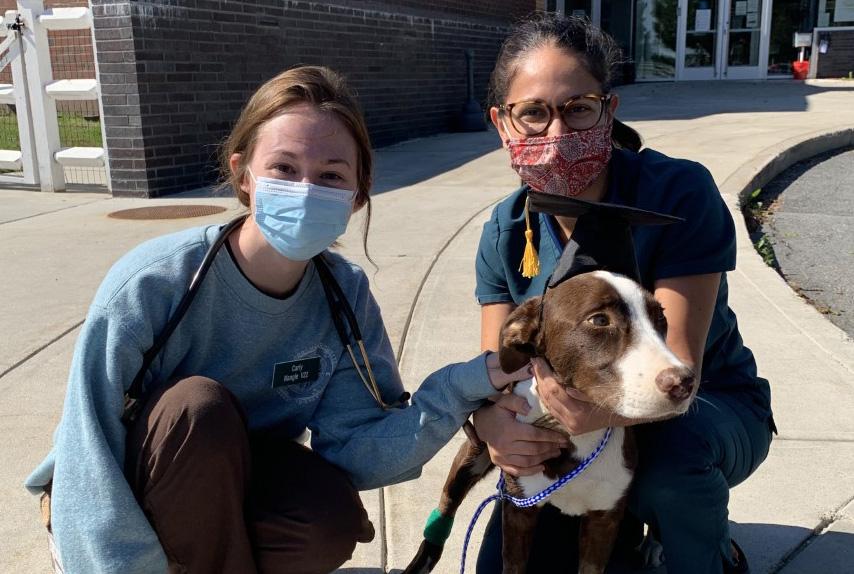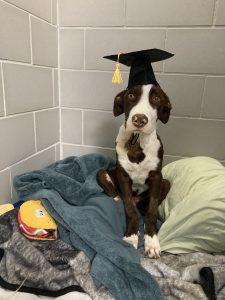-
About
- Leadership & Faculty
- News & Events
-
Admissions
-
Academics
- Graduate
- Advanced Clinical Training
- Continuing Education
- Academic Departments
- Academic Offices
- Simulation Experiences
-
Student Life
- Offices
-
Research
-
- Transformative Research
- Centers & Shared Resources
-
-
Hospitals & Clinics
- Emergency Care
- Hospital Services
-
Community Outreach
- Volunteer
Puppy at Foster Hospital Comes Back from Multiple Organ Failure Caused by Leptospirosis
Herbie literally developed all the complications a dog can get from this disease

When Angie and Joe Cooper adopted Herbie as a puppy, they planned to change his name to Wesley. He became sick so quickly, they never had a chance to change the paperwork, so ended up calling him “Herbie-Wes.”
A mixed breed (part Pit Bull, Staffordshire, Labrador, and Great Pyrenees), Herbie had gastrointestinal issues from the outset, but at four months old his illness took a turn. He had little energy a day after he vomited, appeared disoriented and would not take food or water.
Angie Cooper took him to the veterinarian, who found abnormal results in his bloodwork, so referred Herbie to a local veterinary hospital, where he was diagnosed with Leptospirosis. After a few days at the hospital, Herbie was not getting better.
“He was declining so rapidly,” said Angie. “They told us his prognosis was poor, and there was nothing else they could do but just wait.”
She researched her options and decided to take Herbie to Foster Hospital for Small Animals at Tufts University’s Cummings School of Veterinary Medicine.
“From the beginning, we were treated with such care and understanding at Foster Hospital,” said Angie. “Every staff member we communicated with explained things with great detail and put us at ease, when due to pandemic protocols, we could not be there with him.”
Dr. Emmanuelle Butty, urology and nephrology fellow, Dr. Antonia Ioannou, small animal internal medicine resident, and veterinary technician Dr. Carolyn Tai, treated Herbie.
“We see Leptospirosis quite frequently in New England. It’s a disease caused by a bacterium carried by wildlife. It is often seasonal and comes from rainy days. Dogs get exposed from water or soil contaminated with infected urine,” explained Dr. Butty.
Herbie had elevated kidney values, and the doctors also noticed his jaundiced appearance, so suspected his liver was affected too. They started Herbie on antibiotics to treat the bacterial infection and began dialysis to take over his kidney function.
“From the moment we spoke with Dr. Ioannou, she was kind, thoroughly explained her plan of care, and remained in contact with us every step of the way,” said Ms. Cooper. “We knew then he was in the best hands possible, and for once we felt in our hearts that he may just have a chance at life.”
While Herbie’s kidney and liver values improved, he started having gastrointestinal signs, evidence of blood vessel inflammation, heart arrhythmias, and difficulty breathing, indicating that his other organs were affected. He also developed neurological symptoms.
”Herbie’s kidneys recovered quickly, within the first week. It was everything else that kept him in the hospital,” said Dr. Ioannou. “Only about 20 percent of the Leptospirosis cases we see affect the lungs, but it really decreases the prognosis. Leptospirosis can trigger an exaggerated immune response with an abundant release of cytokines, which can cause more damage than good. A lot of dogs don’t survive. That’s what makes Herbie’s story extra special.”
The doctors administered oxygen to help with Herbie’s breathing and added a cytokine filter to his dialysis treatment, a practice more common with humans receiving dialysis, but relatively new to veterinary medicine, Dr. Butty explained.
“Herbie’s a young dog, young enough to still have enough strength to fight,” said Dr. Butty. “His kidneys completely shut down. Without dialysis, he would have died. Herbie literally developed all the complications a dog can get from this disease.”
After 17 days of intensive treatment at Foster Hospital, Herbie was well enough to go home. He continued on antibiotics and appetite stimulants. When he returned to Foster Hospital three weeks later for his recheck, Dr. Ioannou reported, “Herbie is 100% recovered. He’s a new dog.” And Angie says he’s “back to his super energetic self.”
“Without Dr. Ioannou and the rest of the medical team that cared for him, and our puppy’s strong will to live, we know he would not have made it,” said Ms. Cooper. “We are forever grateful and thankful to them for saving our pup.”
Department:
Foster Hospital for Small Animals
